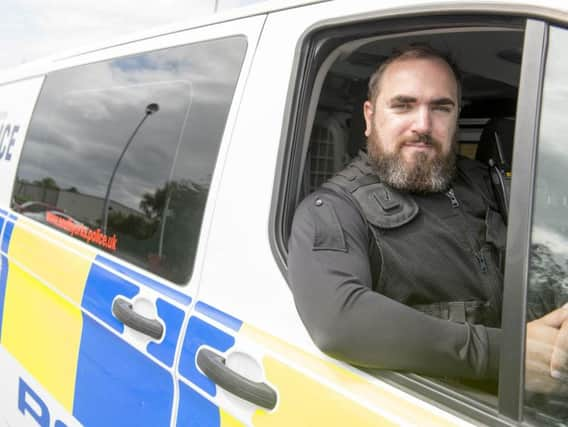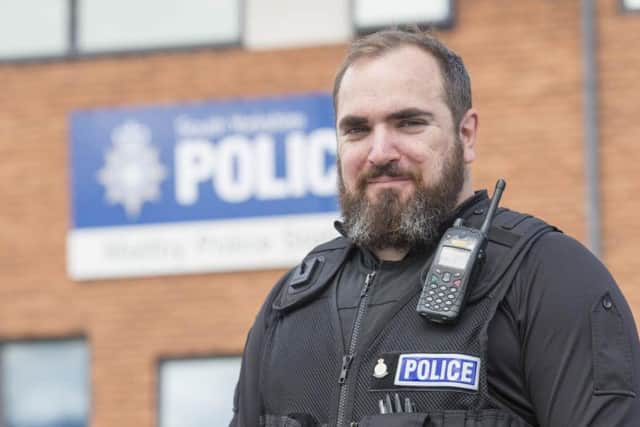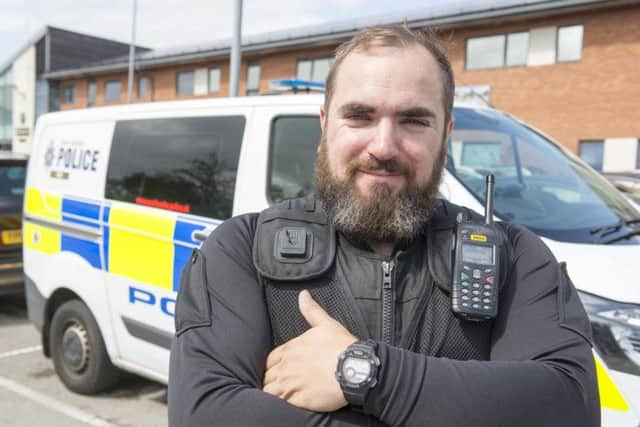How army veteran turned South Yorkshire Police officer is helping others to make the leap


For veterans leaving the armed forces, adjusting to life on civvy street presents a huge challenge – and PC Doug Macdonald was no exception.
Having joined the Army straight out of school, aged 17, and spent eight years serving in the UK, Northern Ireland, Germany, Canada and Afghanistan, he struggled to find his feet after hanging up his uniform for the last time.
Advertisement
Hide AdAdvertisement
Hide AdIt took a couple of years flitting between jobs before he eventually found his new calling when he pulled on another uniform – that of South Yorkshire Police – and rediscovered the sense of purpose which had been lacking in his life.


The 33-year-old father-of-three, who is today a member of the Rotherham South neighbourhood policing team, based in Maltby, counts himself as one of the lucky ones. “When you’re in the armed forces, you do everything together and it’s like being part of an incredibly close-knit family,” he says.
“You come out onto civvy street and it’s a different world, which is why many veterans find it so hard to reintegrate and discover a new sense of purpose and belonging. A lot of people I served with have reintegrated quite well after leaving the Army, but some have struggled and some have ended up rejoining.
Advertisement
Hide AdAdvertisement
Hide Ad"Some ended up getting into trouble with the law and some had mental health issues, being diagnosed with post-traumatic stress disorder (PTSD) because of their experiences.”


Having tried numerous jobs after leaving the Army – including lorry driving, warehouse management and delivering mail – the police proved the perfect fit for Doug, who had always wanted to be part of the thin blue line but was too young to become a police officer when he left school.
He is now doing his bit to help other veterans make that transition – as part of South Yorkshire Police’s Armed Forces Covenant Cohort, which seeks to support veterans and reservists both within the police and in the community.
A big goal for him and other members of the group, made up of veterans within the police force volunteering their time, is identifying ex-servicemen and women who need help with everything from mental health problems to finding somewhere to live or work.
Advertisement
Hide AdAdvertisement
Hide AdEveryone who comes into contact with the police is now asked if they have been in the armed forces and a military tag is placed on incidents involving veterans to help ensure assistance can be provided where necessary.
South Yorkshire Police works closely with Project Nova, a partnership between the armed forces employment charity RFEA and Walking With The Wounded, which supports veterans who have been arrested or are at risk of arrest.
“It’s about looking for missed opportunities to help and getting in touch with those we may have missed before to ask how they’re getting on and if there’s anything we can do to help,” says Doug. “It’s not about veterans getting away with committing crimes.
Advertisement
Hide AdAdvertisement
Hide Ad"They are processed the same as anyone else, but military service can be taken into account if there are any mental health issues, just as a mental health condition would be taken into account for anyone else.”
The force is also doing more to recognise the skills veterans can bring to the police and promote career opportunities to them. “I think a lot of veterans would suit a role with the police because the values and standards you hold in the Army are very similar to those you aspire to as a police officer,” says Doug.
Veterans make up around five per cent of the population in South Yorkshire, Doug explains, and their husbands, wives and children account for some 11 per cent. He believes awareness of the challenges they face is gradually improving but more needs to be done.
There’s a lot of emphasis on building a CV so you’re ready to apply for jobs when you leave, he says, but too little preparation for the culture shock you will face upon leaving a way of life which for many veterans is the only one they have known as adults.
Advertisement
Hide AdAdvertisement
Hide Ad“The Army is more like a family than a job, and many people feel that when they leave they’re out on their own,” says Doug. “You’re used to having everything taken care of so you can focus on the job, and it can be hard to adjust to things most people take for granted like paying the rent and household bills.
“It would be great if there was a reintegration programme in every part of the UK, so you always have someone who understands what you’re going through to talk to and answer any questions.”
He is also keen to raise awareness among the wider community about the challenges veterans face and how their experiences may have moulded their mannerisms, from the black humour developed as a coping mechanism to the blunt way of speaking which is a product of getting things done efficiently.
Doug was born in Inverness and lived an itinerant childhood, moving with his father, Doug Senior, who also served in the Army and whose work took him to Northern Ireland and Germany, among other places. He studied at Wales High School in Kiveton, Rotherham, and lived in South Anston for a while before moving to Retford, in Nottinghamshire, which he still calls home.
Advertisement
Hide AdAdvertisement
Hide AdHaving followed his father into the Army, he served as a mechanic with the Corps of Royal Electrical and Mechanical Engineers. He was deployed to Kabul in Afghanistan during the run-up to the 2009 elections, when there was what he calls a ‘heavy campaign’ of IED attacks on vehicles.
It was obviously a traumatic time, carrying out patrols and dealing with the aftermath of those deadly explosions, but he prefers not to talk about the horrors he witnessed there or the danger he faced.
Despite the demands, he says he loved his time in the Army, where one highlight was helping victims of the floods which devastated Gloucestershire in 2007, when he was called upon to ferry water and other vital supplies to stranded residents.
He decided it was time to leave as his young children were nearing school age and he wanted a more settled lifestyle for them. After two years trying various jobs, he joined Nottinghamshire Police as a PCSO and moved to the South Yorkshire force in 2016.
Advertisement
Hide AdAdvertisement
Hide AdHe initially served on the response team, attending emergency calls, but says he is happier as a neighbourhood officer getting to grips with the long-term problems affecting the community, from class A drug supply to nuisance off-road bikers.
He is also part of a nationwide drive to prevent vulnerable young people being groomed by gangs to become drug runners, and has helped to identify young people in his neighbourhood whose ‘lifestyle and support network’ put them at risk.
One of his proudest achievements with the police has been dealing with a spate of thefts from cars parked at Woodall Services on the M1, where more than 30 vehicles were targeted and over £50,000 worth of goods were stolen.
He was able to track down and return to the owners some of those stolen items, including phones, cameras and various other belongings of sentimental value, and two men from Sheffield have been arrested and bailed in connection with the crime wave.
Advertisement
Hide AdAdvertisement
Hide Ad“The best part of my job is getting to know people in the community and being able to have a positive impact on their lives,” he says.
With his children now at school, would he encourage them to follow him into the Army or police? “I’d always support them in any decision they make, but I wouldn’t want to influence them,” he says. “There are pros and cons to both career paths. They can each be very demanding careers but also very rewarding and enjoyable.”